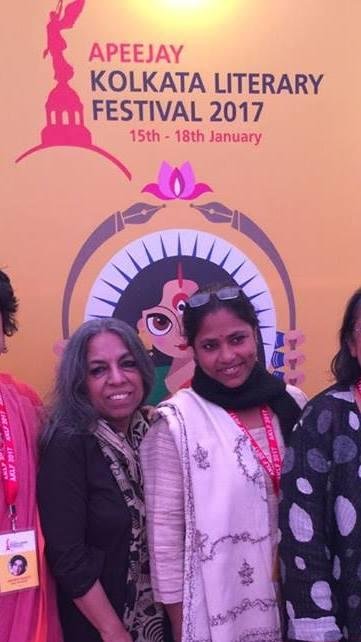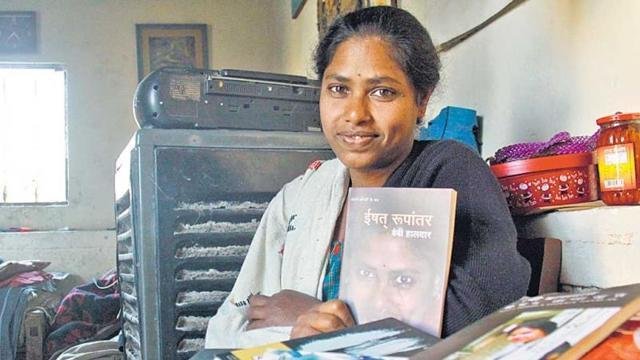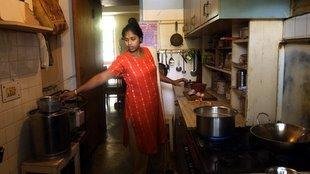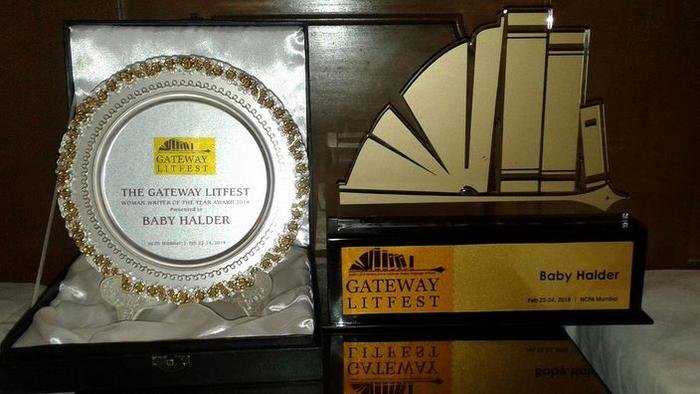Married at 12, a mother at 13, Indian domestic helper Baby Halder, whose book has been translated into 21 local languages and 13 foreign languages, has come a long way from a life of abuse and poverty – not that you would know it.
Forty-three-year-old Baby Halder has published three books, which have been translated into 24 languages and she frequently travels across the country to speak at literary festivals.What makes her story inspiring and significant is the struggle she went through to be where she is today.

Brought up by an abusive father, she was pulled out of school and married off to a guy twice her age when she was 12 years old. Before even knowing what it meant, she became a mother at the young age of 13. She had three children with her husband, before deciding to run away from his constant abuse. She ran away from West Bengal to Delhi and started working as domestic help. Initially, she had to work for families that were looking for ways to exploit her. Talking about the plight of young domestic help, she told.
But all this changed when she came to work for Prabodh Kumar, a retired anthropology professor. The old professor, also the grandson of noted Hindi literary stalwart Munshi Premchand, living in Gurgaon, would look on as Baby, then 29, would meticulously clean every corner of the home, sweep, swab and cook without uttering a word.
But every time she would look at his neatly stacked bookshelf, she would slow down, almost yearning to run her hands over the surface of the Bengali litterateurs’ works. Perhaps she would pick it out when nobody was looking, just to feel the subtle print inside and keep it back. When the professor once asked her if she read, she recalls feeling embarrassed.
Mr Kumar asked Baby Halder to choose a book for her and read. She was hesitant to select at first then she picked up Taslima Nasreen’s Amar Meyebela (My Girlhood).
“Reading Amar Meyebela was as if I was reading my own story aloud,” she says. She continued to read and read until there was no going back.
It wasn’t long until Professor Kumar, before embarking on his trip to South India, handed her a blank copybook and a pen and told her to write.
Frustrated by the weird request, she almost cried. What was she going to write about? The lost childhood she never had? The horror of the night when her innocence was ripped to shreds? The labour pain that ran up her spine at 13 while delivering her child? Or the scars that marred her body due to years of domestic abuse? Even the subdued memory of her sister strangled by her (sister’s) husband nagged at the back of her conscious.

Well, the answer was yes. She wrote till all those repressed memories ran into pages into the notebook, filling it with ink, raw pain and unshed tears.
She thought of her birth mother whom she met in an unstable state years after all her kids were born. She thought of how one word from her sister’s mouth and a hand for help could have saved her from her tumultuous marriage. Perhaps she could be still alive. The floodgates of her past had finally opened, and she was drowning.
But it was more than 20 years since she had written in a book. She stumbled through spellings and sentence construction, but she never gave up. She was redeeming herself through writing!
It was soon a common sight in the Kumar household to see Baby perching her copybook on the kitchen counter, accommodating it between the chopped vegetables and cooked dishes and writing her memories down, as they came to her. She swept and swabbed, but she wrote her book through it.
This routine followed even before and after cleaning dishes and late at night after her kids were tucked safely into bed.
When the professor returned, she had already written over 100 pages! It was only when the retired professor read the manuscript, he knew this story deserved telling. Raw and heart-wrenching, her simplicity of writing had the power to pull the heartstrings of the reader. He cried as he read it and blessed her, encouraging her never to stop writing.

Prof Kumar shared her work with Ashok Seksariya and Ramesh Goswami, who loved Baby’s work so much, they placed it on the pedestal of the Diary of Anne Frank.
And that’s how Baby’s first book, her autobiography, Aalo Aandhari (Light and Darkness) was in Bangla. Professor Kumar translated the text in Hindi. Finding a publisher was not easy. Then a small publishing house in Kolkata, Roshani Publishers, came to their aid.
Moved by her story, the publisher was all set to bear the risk of a loss. But Aalo Aandhari sold right from the first day it launched in 2002. People from all walks of life wanted to grab their copy. Baby’s writing had admirers from the sweepers to the retired headmistress next door. It immediately got extensive media attention as it threw light on the hard lives led by domestic servants in Asia, and within two years, it had published two more editions.
But for Baby, the best thing about her rebirth as an author is the regard of her new friends. “For the first time in my life, I feel confident that my story is worth telling, and in my own words.”
 !
!
Today the book has been translated into 21 local languages and 13 foreign languages, including French, Japanese, Korean and German.
Now, Baby Halder has her own house in Kolkata. She is financially independent.
“Writing gave me the identity I never had. It is my life. How could I ever stop living my life?” She added with a laugh.!